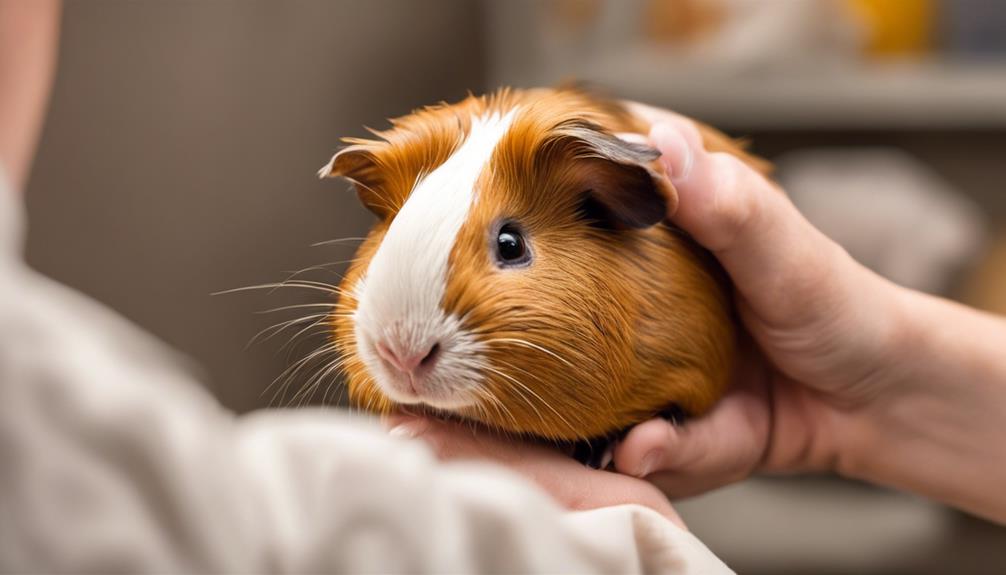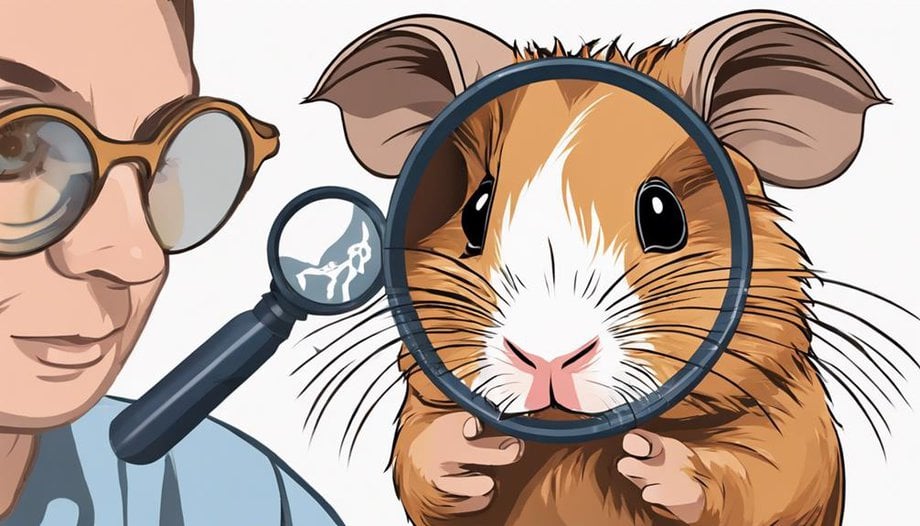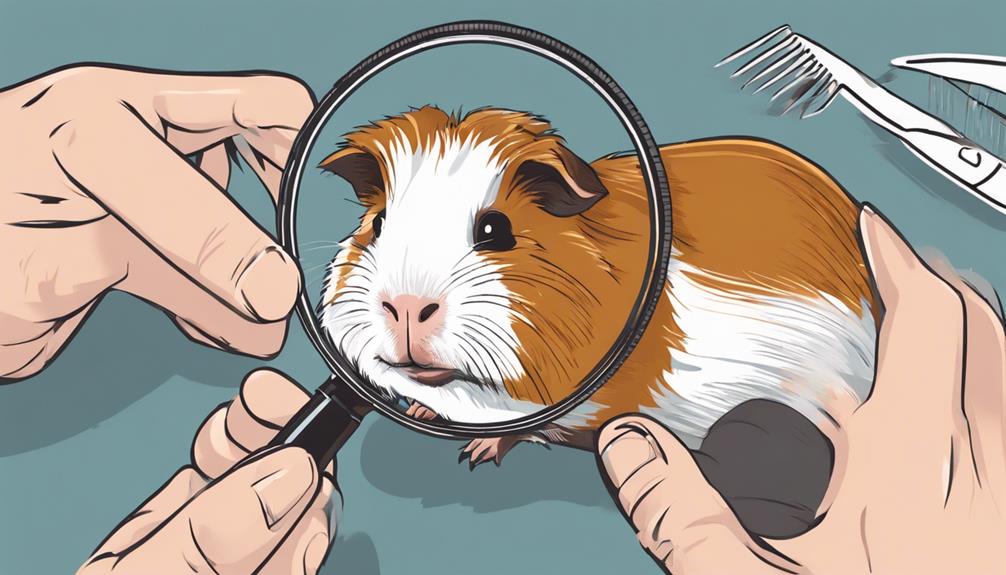How to Check Your Guinea Pig for Parasites

Parasites can be a common issue for guinea pigs, so it's important to regularly check them for any signs. Key techniques include examining their fur for any unusual patches or bald spots, checking their ears for any discharge or redness, and inspecting their droppings for signs of worms. Additionally, keeping an eye out for symptoms such as weight loss, lethargy, or excessive scratching can also indicate a parasite infestation. If you notice any of these signs, it's essential to consult a veterinarian for proper diagnosis and treatment. Remember, early detection is crucial for your guinea pig's well-being.
Always prioritize the health and happiness of your furry friend by staying vigilant and proactive in monitoring their overall condition.
Key Takeaways
- Regular parasite checks are essential for guinea pig health and well-being.
- Behavioral changes and physical signs indicate potential parasite infestation.
- Create a safe examination environment and inspect thoroughly using proper techniques.
- Prompt response to findings with veterinary guidance ensures effective prevention and treatment.
Importance of Regular Parasite Checks
Regularly checking your guinea pig for parasites is important to guarantee their overall health and well-being. Parasite prevention is an essential aspect of caring for these small pets. By conducting regular check-ups, you can catch any potential issues early on, preventing more severe infestations or illnesses from taking hold.
Ensuring that your guinea pig is free from parasites not only contributes to their physical health but also impacts their mental well-being. These furry companions thrive in clean and healthy environments, and being vigilant about parasite prevention is a key component of maintaining their happiness.
Regular check-ups should be integrated into your routine care for your guinea pig, along with providing them with a balanced diet and ample exercise. By staying proactive and attentive to your pet's needs, you're embodying the spirit of a caring and responsible guinea pig owner. Remember, prevention is always better than cure when it comes to parasites and your beloved guinea pig.
Signs of Parasite Infestation
When it comes to your guinea pig's health, being vigilant is key. Look out for common parasite symptoms such as itching, hair loss, and changes in appetite.
Keep a close eye on any behavioral changes or physical signs that may indicate a parasite infestation, ensuring your furry friend stays healthy and happy.
Common Parasite Symptoms
Signs of parasite infestation in guinea pigs can manifest in various ways, indicating the presence of potential health concerns that require attention. Keep an eye out for these common symptoms:
- Weight Loss: Sudden or unexplained weight loss can be a sign of parasite infestation.
- Rough Coat: A dull, unkempt coat may indicate the presence of parasites.
- Lethargy: Guinea pigs infected with parasites may appear tired or less active.
- Diarrhea: Changes in stool consistency can be a red flag for parasites.
- Itching or Scratching: Excessive scratching or itching, especially around the ears and rear end, might suggest a parasite issue.
For effective parasite prevention and treatment options, consult a veterinarian promptly.
Behavioral Changes to Watch
Observing subtle shifts in your guinea pig's daily habits can provide valuable insights into potential parasite infestations that may require prompt veterinary attention. Keep an eye out for any diet changes or unexplained weight loss, as these could indicate a parasitic infection affecting your furry friend.
Additionally, increased aggression or lethargy in your guinea pig may be signs of a parasite infestation that needs to be addressed promptly. Changes in behavior can often be early indicators of underlying health issues, so monitoring your guinea pig closely for any deviations from their normal demeanor is crucial.
If you notice any of these behavioral changes, consulting with a veterinarian to ensure your pet's well-being is advisable.
Physical Signs to Check
To make sure the well-being of your guinea pig, carefully inspect their physical appearance for any signs of parasite infestation. Here are some key physical signs to watch for:
- Weight Loss: Sudden or unexplained weight loss could indicate a parasite infestation.
- Lethargy: If your guinea pig seems unusually tired or inactive, parasites might be the cause.
- Appetite Changes: A decrease or increase in appetite could signal a parasitic issue.
- Hair Loss: Patchy fur or excessive shedding may be a result of parasites affecting your pet.
- Skin Irritation: Check for redness, flakiness, or sores on the skin, as these could be signs of a parasitic infection.
Regularly monitoring these physical signs can help you catch and address any potential parasite infestations promptly.
Gathering Necessary Supplies
Begin by assembling all the necessary supplies to effectively check your guinea pig for parasites. Proper handling is important to guarantee the comfort and safety of your pet throughout the examination. To create a safe environment for your guinea pig, gather a soft towel or blanket to gently wrap them in, helping to keep them calm and secure during the process. Additionally, have a small, well-lit area prepared where you can comfortably inspect your guinea pig without distractions.
You will also need a fine-toothed comb to carefully examine your guinea pig's fur for any signs of parasites. A magnifying glass may be helpful in spotting tiny insects or eggs that could be easily overlooked. Prepare a small container with warm water to rinse the comb between strokes, ensuring a thorough inspection. Finally, have a pair of gloves on hand to protect yourself from coming into direct contact with any potential parasites that may be present.
Preparing Your Guinea Pig

Prep your guinea pig by gently stroking its fur to help them relax before the parasite check. This step is essential in creating a calming environment for your furry friend. Here are some essential preparing techniques and grooming tips to keep in mind:
- Create a Quiet Space: Find a peaceful area free from distractions to help your guinea pig feel at ease.
- Use a Soft Brush: Gently brush your guinea pig's fur to remove any loose hair and debris, promoting a healthy coat.
- Check for Tangled Fur: Carefully examine your guinea pig's fur for any knots or tangles that may need to be gently untangled.
- Trim Overgrown Nails: Trim your guinea pig's nails if they're too long to prevent discomfort and potential injuries.
- Inspect Ears and Eyes: Take a moment to look at your guinea pig's ears and eyes for any signs of redness, discharge, or irritation.
External Inspection Techniques
When inspecting your guinea pig for parasites, it's important to carefully examine its coat and skin as well as its eyes and ears.
These external features can provide valuable insights into your pet's overall health and well-being.
Coat and Skin
Inspect the guinea pig's coat and skin for any signs of parasites using gentle yet thorough external examination techniques. Skin health and fur texture are key indicators of a guinea pig's overall well-being. Here are some steps to help you assess your pet's coat and skin effectively:
- Check for Bald Spots: Look for any areas where the fur is thinning or missing.
- Inspect for Flakes or Crusts: Check for dandruff-like flakes or crusts on the skin.
- Look for Redness or Irritation: Examine for any red or irritated patches on the skin.
- Feel for Lumps or Bumps: Run your fingers gently over the skin to detect any unusual lumps or bumps.
- Observe for Parasites: Keep an eye out for any visible parasites such as fleas or mites.
Eyes and Ears
During a thorough examination of your guinea pig, carefully evaluate its eyes and ears for any signs of abnormalities or parasites. Checking your guinea pig's eyes for any redness, discharge, or cloudiness can help detect potential eye infections early on.
Similarly, inspecting the ears for signs of ear mites such as dark debris or excessive scratching is essential for your pet's health. Prevention of ear mites can be achieved through regular cleaning and avoiding contact with infected animals.
If your guinea pig does develop an eye infection, prompt treatment is vital to prevent further complications. Consult a veterinarian for proper diagnosis and medication.
Internal Inspection Techniques

To guarantee the well-being of your guinea pig, it's essential to employ effective internal examination techniques. When conducting an internal inspection, remember to be gentle and observant to make sure your furry friend's health is in top condition.
Here are some key techniques to help you perform a thorough examination:
- Gently Palpate the Abdomen: Feel for any unusual lumps or bumps that may indicate internal issues.
- Observe Eating and Drinking Habits: Changes in appetite or water intake could indicate underlying problems.
- Check Fecal Matter: Look for consistency, color, and any signs of parasites.
- Monitor Weight: Regular weigh-ins can help track your guinea pig's health status.
- Listen for Abnormal Sounds: Use a stethoscope to listen for any irregularities in breathing or digestive noises.
Responding to Parasite Findings
Upon discovering parasites during the internal inspection of your guinea pig, it is essential to promptly address the situation with appropriate veterinary guidance for effective treatment. Seeking veterinary care is vital as they can recommend suitable treatment options and provide the necessary support system for both your pet and you. Dealing with parasite findings can have an emotional impact, and having a professional guide you through the process can alleviate some of the stress.
| Treatment Options | Support System | Veterinary Care | Emotional Impact |
|---|---|---|---|
| Medications prescribed by the vet | Family and friends | Regular check-ups | Feelings of concern and worry |
| Dietary adjustments | Online guinea pig communities | Expert advice | Fear for the well-being of the pet |
| Environmental changes | Pet support groups | Monitoring progress | Relief upon seeing improvement |
Prevention Tips and Conclusion

After addressing parasite findings with veterinary guidance, implementing effective prevention measures is key to guaranteeing your guinea pig's long-term health and well-being. To keep your furry friend healthy and parasite-free, consider the following tips:
- Maintain a Balanced Diet: Providing your guinea pig with a diet rich in Vitamin C and fiber can help boost their immune system, making them less susceptible to parasites.
- Regularly Clean the Habitat: Keeping your guinea pig's living space clean and dry can prevent parasites from thriving in the environment.
- Consult a Veterinarian: Regular check-ups with a veterinarian can help catch any potential parasite infestations early on, allowing for prompt treatment.
- Implement Hygiene Practices: Washing your hands before and after handling your guinea pig, as well as regularly cleaning their bedding and toys, can help prevent the spread of parasites.
- Consider Treatment Options: If your guinea pig does contract parasites, work with your veterinarian to explore appropriate treatment options to guarantee a quick and effective recovery.
Frequently Asked Questions
Can Guinea Pigs Get Parasites From Other Animals in the Household?
Guinea pigs can get parasites from other animals in the household, posing cross-contamination risks. Preventative measures include regular veterinary check-ups, keeping all pets clean and separated, and maintaining a hygienic living environment to safeguard their health.
Are There Any Natural Remedies for Treating Parasites in Guinea Pigs?
Herbal treatments can be beneficial for treating parasites in guinea pigs. Prevention is key to maintaining their health. Regularly cleanse their environment, assure a balanced diet, and consult a veterinarian for safe and effective remedies.
How Often Should I Check My Guinea Pig for Parasites?
To secure parasite prevention, it's advisable for guinea pig owners to conduct routine check-ups. By checking regularly, they can catch any issues early on and provide timely care, promoting their pet's health and well-being.
Can Parasites in Guinea Pigs Be Transmitted to Humans?
Parasite prevention in guinea pigs is essential for humans' well-being. Zoonotic transmission poses risks, as some parasites can be transmitted from guinea pigs to humans. Proper hygiene and regular veterinary care help mitigate these concerns.
Are There Any Specific Signs of Internal Parasites That I Should Be Aware Of?
Weight loss, hair loss, diarrhea, and behavioral changes are signs of internal parasites in guinea pigs. When observing these symptoms, it's important to seek veterinary care promptly to guarantee the well-being of the furry friend.











